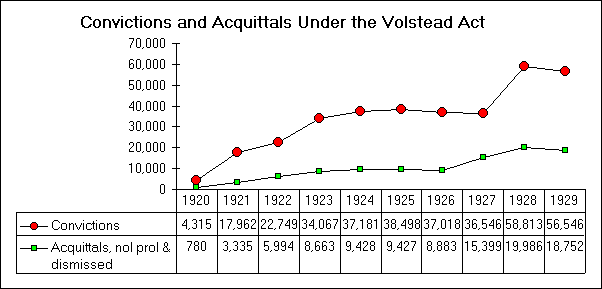Then what's your solution? Keep prohibition around even though you acknowledge how bad the problems it causes are?
Translation: We can't end prohibition because prohibition has created too many problems.
I looked into what mobsters did after alcohol prohibition was repealed, and many of them flooded over into other "shady" industries like gambling, racketeering, high interest "juice" loans, counterfeitting, etc. But they didn't shoot up legitimate businesses because they knew it wouldn't accomplish the goal of eliminating the competition. So yeah, when drug prohibition is repealed we should anticipate where these people will go next so we can deal with them there.
The Lessons of Prohibition and Drug Legalization
Let us examine the differences that Teasley (and others) cite between the era of Prohibition and the era in which we now live.
First, during prohibition the government sought to restrict the consumption of alcohol although it lacked the moral consensus of the nation. That is, even during Prohibition, most people were accepting of alcohol.98 Such is not the case today, for the vast majority of citizens do feel that illicit drugs should remain illegal [see Chapter Eleven]. Thus, Prohibition went against the national consensus whereas illegalization of drugs does not.
Second, the laws of Prohibition themselves were different than those dealing with illicit drugs today. During Prohibition, it was not illegal to drink alcohol, it was only illegal to sell it. Today, however, it is both illegal to sell and to use illicit drugs. Consequently, today's laws can target the users while those of the Prohibition era could not.99
Third, during the Prohibition era several states did not support the federal laws. This fact created tension between the state and federal governments and hampered effective prosecution of alcohol distributors. Today, 48 states have signed the Uniform Controlled Substances Act, and all are in effective agreement with the federal government in matters of drug policy - a state/federal consensus exists that was not present during Prohibition.100
Fourth, criminal penalties are much more severe today than in the 1920's. For example, the first-offense bootlegger faced a maximum fine of $ 1,000 or six months in prison. Today, a first-offense trafficker of cocaine or heroin (of less than 100 grams) faces fines up to $1 million and imprisonment for up to 20 years.101
Fifth, during Prohibition the United States was a "dry" nation within a "wet" international community. Just as the Prohibition policies were counter to the moral consensus within the U.S., they were also at odds with that of the international community (which explains why so much alcohol was imported from Canada). But as discussed in Chapter Three, the international community is resolute when it comes to drug policy; in December of 1988 over 80 countries signed the Convention Against Illicit Traffic in Narcotic Drugs and Psychotropic Substances.102 Sixth and finally, the administrative structure of the government agencies designed to carry out the Prohibition laws was narrow, unstable, and filled with political appointees. Today's national drug strategy involves over a dozen federal agencies coordinated by the Office of National Drug Control Policy. In short, the governmental bodies that prosecute today's drug violators are much larger, have much better resources, and are much more professional than their Prohibition counterparts.103
Thus, it is factually incorrect for the legalizers to analogize our history with Prohibition to today's drug policies. They simply do not have that much in common. But should the legalizers choose to make such an analogy, they also should be made aware of the fact that Prohibition was on balance a successful program.
First, use of alcohol decreased significantly during Prohibition.104 This decrease in turn lead to a marked decrease in the incidence of cirrhosis of the liver.105 Also, alcohol-related arrests decreased 50%. 106 Finally, the suicide rate also decreased by 50%.107
A second reason why Prohibition was a successful program is due to the fact that it did not -- contrary to popular myth -- cause an increase in the crime rate. It is true that there was an increase in the homicide rate during Prohibition, but this is not the same as an increase in the overall crime rate. Furthermore, the increase in homicide occurred predominantly in the African-American community, and African-Americans at that time were not the people responsible for alcohol trafficking.108 The drama of Elliot Ness and Al Capone largely was just that, drama sensationalized by the media of the time.
In short, it is doubtful that one legitimately may analogize Prohibition with our current efforts to control drugs. There are too many differences in the laws, the political establishment, the moral consensus, and the international community to make such analogizing worthwhile. Nonetheless, the fact remains that Prohibition accomplished many of its goals, improved the health of the entire nation, and did not cause a significant increase in the crime rate. Mark Kleinman, who has proposed legalizing marijuana109 notes, the U.S. experience with Prohibition is the best evidence to support the continued illegalization of illicit drugs.




